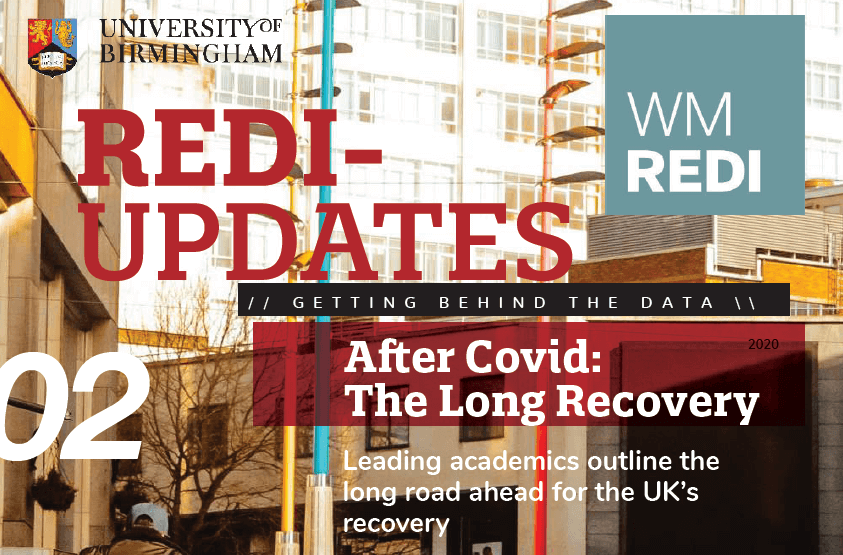Welcome to REDI-Updates. REDI-Updates is a bi-annual publication which will get behind the data and translate it into understandable terms. In this edition, WM REDI staff and guest contributors will discuss some of the key topics when trying to understand the long-term economic impacts of the pandemic.
When the last edition of REDI-Updates was published COVID-19 was an unknown disease.
Now it has changed everything.
The global pandemic and the resulting government-sanctioned lockdowns have caused huge economic damage. The UK saw negative growth of 22.1% in quarter 2 – this will not be clawed back easily.
The pandemic has led to the redundancies of workers across all sectors, from services to construction and manufacturing. The government’s Coronavirus Job Retention Scheme appears to have successfully prevented the mass unemployment that the United States experienced, but the CJRS may have simply delayed the inevitable – nobody knows what will happen when the scheme is rolled up.
Here at WM REDI, we have utilised our research and policy skills to support local authorities, the West Midlands combined authority and other key partners in their understanding of the effects of the pandemic. Via the West Midlands Weekly Monitor, we have highlighted key trends and data points to partners. Each week the monitor pulls together live and as up-to-date data as possible, from across regional partners.
Where possible it has utilised all forms of quantitative and qualitative intelligence to cover the immediate effect of the Covid-19 pandemic on the economy.
In this edition of REDI-Updates, we try to better understand the long-term economic impacts of the pandemic. There are early signs that the pandemic is causing sustained behavioural changes in the labour force and from consumers. Nine in ten UK employees who have worked from home during lockdown would like to continue to do so in some form. The British Independent Retailers Association (BIRA) has resisted calls for workers to move from remote working to office-based work, claiming they are beneficiaries of a more localised home-based work.
The change of many people’s location of work is likely to result in reduced commercial property value and demand as well as an acceleration of the decline of the high-street. In this edition, WM REDI’s business director, Rebecca Riley assesses the challenges facing the high street and the importance of place in policy-making. The decline of the high street is not inevitable and Rebecca argues that policy-makers should embrace the crisis to support the high-street evolution.
The challenge to the high-street is not the only major long-term consequence of the pandemic. The labour market may collapse and we may see 1980s-level unemployment. Professor Anne Green and Dr Abigail Taylor analyse the data and discuss what it indicates. Professor Green outlines why the nature of this pandemic and the economic downturn will disproportionately affect the youngest in society.
The UK’s economic recovery is linked to how the labour market responds to the stresses of the economic downturn. The Government is acutely aware of that. The government’s strategy to ‘build, build, build’ is in part down to the need to retain jobs and create new ones.
REDI-Updates spoke to the Housing Minister, the Rt Hon Christopher Pincher MP, in July, to discuss the government’s strategy and why house-building is a central part of the government’s recovery strategy.
The road to a sustained recovery may be long and the ‘new normal’ may inhibit the speed and potency of that recovery. The last edition of REDI-Updates covered the importance of inclusive growth and its importance, which given the health crisis may be more important than ever.
View and download the magazine.
This blog was written by Ben Brittain, Research Fellow, City-REDI / WM REDI, University of Birmingham.
To sign up for our blog mailing list, please click here.
Disclaimer:
The views expressed in this analysis post are those of the authors and not necessarily those of City-REDI / WM REDI or the University of Birmingham

